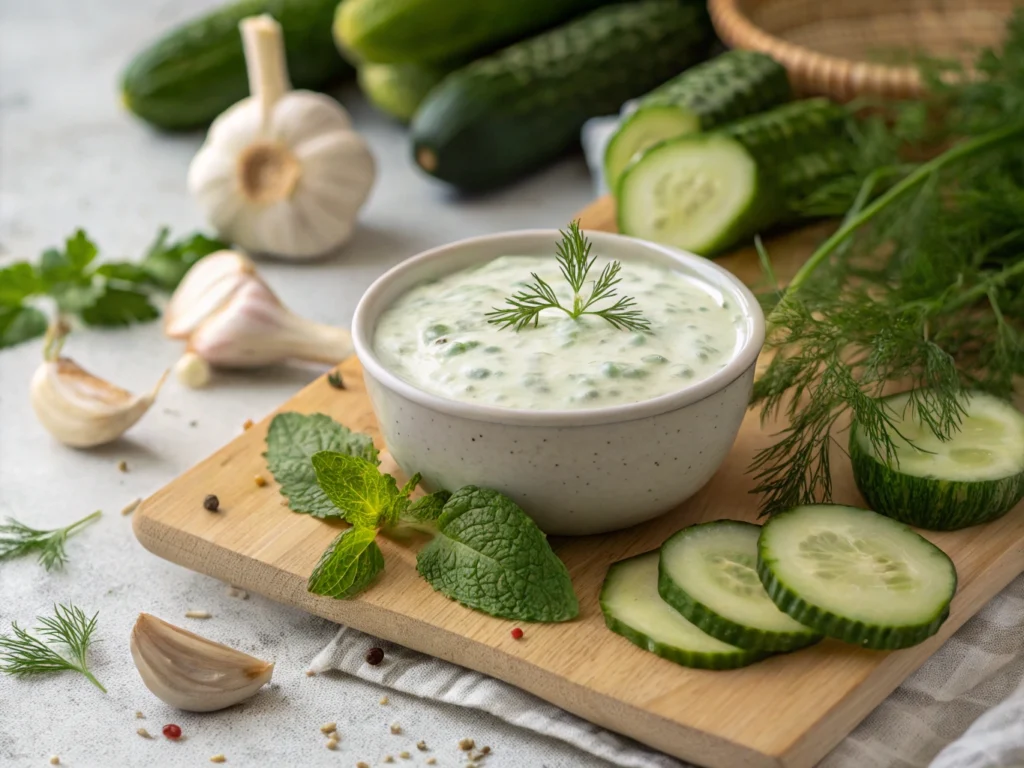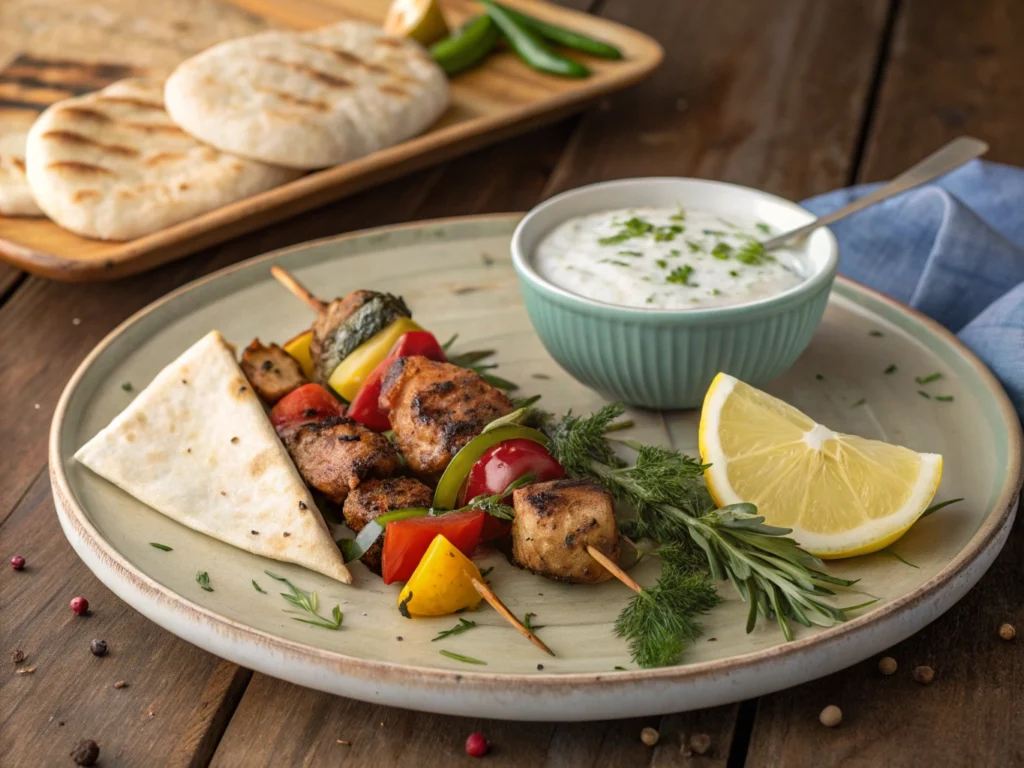
ANNONCE
Table of Contents
Souvlaki is an iconic dish in Greek cuisine, appreciated for its simplicity, versatility, and exquisite flavors. Originating from Greece, this dish, primarily made of small marinated meat skewers grilled to perfection, has spread far beyond the borders of its home country. In this article, we will explore souvlaki from every angle, from its history to its preparation, including the differences from other popular dishes like gyros and souva. This comprehensive guide will provide you with all the necessary information to master the recipe and enjoy a delicious meal, whether you are a cooking novice or a Mediterranean flavor enthusiast.
ANNONCE

What is Souvlaki?
Origin and History of Souvlaki
Souvlaki is a traditional Greek dish that dates back centuries. Its name comes from the word “souvla,” which means “skewer” in Greek. This dish was born in the streets of Greece, where it was made from pork, chicken, beef, or lamb meat, cut into pieces, skewered, and then grilled. Traditionally, it is served with pita bread, tzatziki, grilled vegetables, and sometimes fries. Souvlaki was popularized by the Greeks themselves, who made it a quick and tasty meal for their busy days.
With the rise of Greek cuisine around the world, particularly in Greek diaspora neighborhoods in North America and Europe, souvlaki has become one of the most popular Mediterranean dishes. Today, it can be found in many restaurants, either as skewers, in pitas, or in a full meal with various garnishes.
ANNONCE
Different Varieties of Souvlaki
Souvlaki has various versions depending on the regions of Greece and the personal preferences of the chefs. While pork meat is the most common, there are also souvlakis made with chicken, beef, lamb, and even vegetarian options. In rural areas, souvlaki was often made with lamb or goat meat, which was more readily available.
A very popular version is souvlaki pita, where the grilled meat skewers are placed in pita bread with fresh vegetables, tzatziki, and sometimes fries. In some regions, souvlaki is served as skewers on their own, accompanied by salads or grilled vegetables.
How to Make Souvlaki at Home?
Essential Ingredients for Souvlaki
Making souvlaki at home doesn’t require complicated ingredients. For a traditional souvlaki, you will need:
- Meat: Choose tender meat like pork, chicken, or beef. You can also opt for tofu or vegetables for a vegetarian version.
- Marinade: The marinade is crucial for tender, flavorful meat. It generally consists of olive oil, lemon juice, garlic, oregano, salt, and pepper. Yogurt can be added for extra tenderness.
- Spices: Spices play an essential role in the flavor of souvlaki. Cumin, paprika, and chili are often used to add depth to the marinade.
- Accompaniments: Traditionally, souvlaki is served with tzatziki, warm pita bread, and sometimes grilled vegetables like tomatoes, peppers, and onions.
Steps for Preparing Souvlaki
Making souvlaki at home follows a few simple steps:
ANNONCE
- Prepare the marinade: In a large bowl, mix olive oil, lemon juice, minced garlic, oregano, and spices. Add the cut meat and let it marinate for at least 2 hours, or overnight for a stronger flavor.
- Skewer the meat: Once the meat is marinated, thread it onto wooden or metal skewers.
- Grill: Heat a grill or skillet over medium-high heat. Grill the skewers for about 8 to 10 minutes, turning them regularly until the meat is golden and thoroughly cooked.
- Serve: Serve the souvlaki with pita bread, tzatziki, and grilled vegetables.

Tips for a Perfect Souvlaki
To achieve perfectly grilled souvlaki, it’s essential to:
- Avoid overcooking the meat, as it can become dry; aim for a juicy, tender result.
- Let the meat marinate long enough for the flavors to fully infuse.
- Use appropriately sized skewers for even cooking.
Souvlaki vs. Gyros: What’s the Difference?
Differences in Preparation Between Souvlaki and Gyros
Although souvlaki and gyros are often confused, there are notable differences in their preparation. Souvlaki is made from marinated pieces of meat that are grilled on skewers, while gyros is made from meat (usually pork or chicken) cooked on a vertical rotisserie, similar to kebab. The gyros meat is then sliced thinly, while souvlaki is often served in larger chunks, grilled individually.
Differences in Presentation and Accompaniments
In terms of presentation, souvlaki is usually served on skewers, either in pita bread with toppings or separately with vegetables. Gyros, on the other hand, is almost always served in pita, with garnishes of tomatoes, onions, and often fries, accompanied by tzatziki or sometimes mayonnaise.
Ideal Accompaniments to Serve with Souvlaki Skewers
Tzatziki: The Unmissable Sauce
Tzatziki, a sauce made from yogurt, cucumber, garlic, and olive oil, is the classic accompaniment to souvlaki. Its freshness and lightness perfectly balance the richness of the grilled skewers. You can add some mint or dill for variation in flavor.
ANNONCE
Pita Bread and Grilled Vegetables
Pita bread is another essential element in serving souvlaki. This soft, slightly grilled bread wraps around the meat and toppings, providing a complete culinary experience. Grilled vegetables like peppers, tomatoes, and onions add color and flavor, making the dish even more delicious and nutritious.

The Difference Between Souvlaki and a Skewer
Characteristics of Souvlaki Compared to a Classic Skewer
Although souvlaki is often referred to as a skewer, there are significant differences between the two. A classic skewer can be made from any type of meat or vegetables, simply grilled on a skewer. Souvlaki, on the other hand, is distinguished by its specific marinade and accompaniments, which give it a unique flavor. Additionally, souvlaki is often served with additional garnishes, which is not always the case for a classic skewer.
Variations of Greek Skewers: Souvlaki or Others?
In addition to souvlaki, there are many other variations of Greek skewers, such as kebab. The Greek kebab is generally made with minced meat, while souvlaki is composed of whole pieces of marinated meat, grilled on skewers.
The Greek Souva: A Term to Know
What is Souva?
Souva is a term sometimes used to refer to souvlaki, although it can also refer to a specific souvlaki variant in certain regions of Greece. Souva is often cooked on a vertical rotisserie, similar to gyros, and may be served in different forms.
ANNONCE
Souva vs. Souvlaki: A Detailed Comparison
Souva and souvlaki primarily differ in their cooking method. While souvlaki is grilled on skewers, souva is cooked on a vertical rotisserie, similar to gyros. Both can be served in pita, but souva is often spicier and juicier due to its cooking method.

FAQ About Souvlaki
What is the difference between gyros and souvlaki?
Gyros is made from meat cooked on a vertical rotisserie, sliced thinly, while souvlaki is made from marinated pieces of meat grilled on skewers.
What is souvlaki made of?
Souvlaki is mainly made of marinated meat (pork, chicken, beef), pita bread, tzatziki, and sometimes grilled vegetables like peppers and tomatoes.
What’s the difference between souvlaki and a skewer?
Souvlaki differs from a classic skewer by its specific marinade and accompaniments, making it more flavorful and varied in presentation.
ANNONCE
What is Greek souva?
Souva is a variant of souvlaki, cooked on a vertical rotisserie, similar to gyros.
Tips for Personalizing Your Souvlaki
Spices and Herbs to Add for a Unique Flavor
Cumin, paprika, and cayenne pepper can be added to the marinade for a spicier version of souvlaki. Herbs like rosemary and thyme are also excellent for adding authentic Mediterranean flavors.
Vegetarian Options and Alternatives
For a vegetarian version of souvlaki, you can replace the meat with marinated tofu, mushrooms, or vegetables like zucchini and eggplant, which grill beautifully and absorb the flavors of the marinade.

